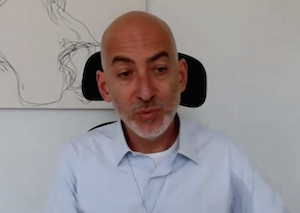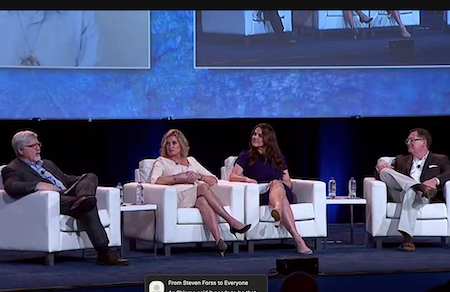 “Auto everything” has solved a lot of problems, but the personalization required for decumulation strategies requires a different approach, Prof. Schlomo Benartzi suggested at an April 3 general session at the 2022 NAPA 401(k) Summit.
“Auto everything” has solved a lot of problems, but the personalization required for decumulation strategies requires a different approach, Prof. Schlomo Benartzi suggested at an April 3 general session at the 2022 NAPA 401(k) Summit.
Benartzi, Professor Emeritus of the UCLA Anderson School of Management and founder of PensionPlus, was joined by Barbara Delaney, Principal of StoneStreet Renaissance, a HUB International Company; Lisa Buffington with Marsh & McLennan; Don MacQuattie, Senior Vice President and Head of Retirement & Institutional at Raymond James; along with ARA Chief Content Officer Nevin Adams as panel moderator.
In thinking about the average worker who does not necessarily have a million dollars saved for retirement, Benartzi contends that the industry has to move beyond simply having a one-size-fits-all product available, to more personalized solutions. “I think we have to start with the process and create plans for everyone, regardless of how much money they have. And for that, we’re going to have to understand the psychology of the participant; otherwise they are not going to care about the [educational] classes we create,” he said.
And with that comes the behavioral insights, which he explains are having the tools necessary to succeed by engaging participants to give them their desired retirement. Otherwise, he noted, they might roll their money outside the plan because they perceive there is not a great solution in the plan or they are not aware of it, and consequently end up paying more in fees.
In fact, Benartzi found that plan advisors can lose up to 5% of plan assets every year due to participants not finding a solution in the plan. For example, he noted that he had met with an advisor who has $6 billion in AUA, but loses $350 million every year because they have not solved the retirement income issue for participants in the plan. As such, the advisor has to sell $350 million worth of plans each year to make up for the leakage, he noted.
At the same time, he suggests that proposals in Washington that would permit lifetime income annuities as a default would also be tricky because people are very different—and Benartzi suggests that the industry needs to start recognizing those differences. “It's going to be very difficult to actually create a personalized solution unless we engage people, and we have to start thinking about how to do it, because decumulation is a really hard thing to do that people lose sleep over,” he noted.
Moreover, he suggests that the “auto-everything” features that worked for building retirement wealth will not work on the decumulation side because of these differences and would fit only 4% of people in retirement.
So how does the industry actually help people make informed choices when they are not experts on the topic? Benartzi suggests presenting tradeoffs, citing the behavioral process of an “informed tradeoff engine” that provides a visually appealing decision tree that offers realistic projections based on the various questions and answers provided, as opposed to a simple, online calculator. An informed tradeoff engine can help people find the tradeoff that best fits their preferences and needs, he suggests. “People tend to neglect the big picture, so we should make holistic planning easy,” he says.
Benartzi also suggests that the process needs to remain fairly quick and stay focused on the positive in order to not lose people’s interest. “The point I’m making is that we also need to have the tools to tell the participants how much of each product would fit their plan and start with the plan with the process, not with the product,” he emphasized.
Panel Discussion
As for the panel’s reaction to Benartzi’s presentation, Delaney agreed with the premise that the industry needs to change. She explained that when she first started working in the 401(k) industry, they actually spoke to people and enrolled them, but as everything took off, the industry got away from talking to people. “But now we’re at a shift where we are seeing people starting to retire in droves, and from a business perspective, I think the advisor community is at a pivotal stage in the development of 401(k)s that we need to become involved with that being part of our practice, working with employees through FinTech, or manage accounts or any vehicle,” she noted. 
Similarly, Buffington noted that her firm is very supportive of engaging participants and has been in discussions with Benartzi about the very approach he discussed. To that end, she explained that their process right now is focused more on sharing projection statements with individuals to help them understand what they have in retirement today and what they will need for retirement. “But what Schlomo has really done highlighted for us the other side of that equation about the emotional side and the trade-off discussions that that need to be had,” she noted, adding that they are excited about the evolution of the technology.
In observing that the industry has not been particularly good at retirement income in a lot of ways, MacQuattie applauded Benartzi’s work, noting that he believes the behavioral aspect into this will catch up and that this is good step. But he worries that there is no consensus within the industry on the actual solution, as well as no real recordkeeping infrastructure, which can lead to all kinds of downstream issues. “Some of the smartest people I know are in this room and you get different answers when you talk about retirement income and the best way to solve it,” MacQuattie emphasized.
Photo (left to right): Adams, Delaney, Buffington, MacQuattie.

